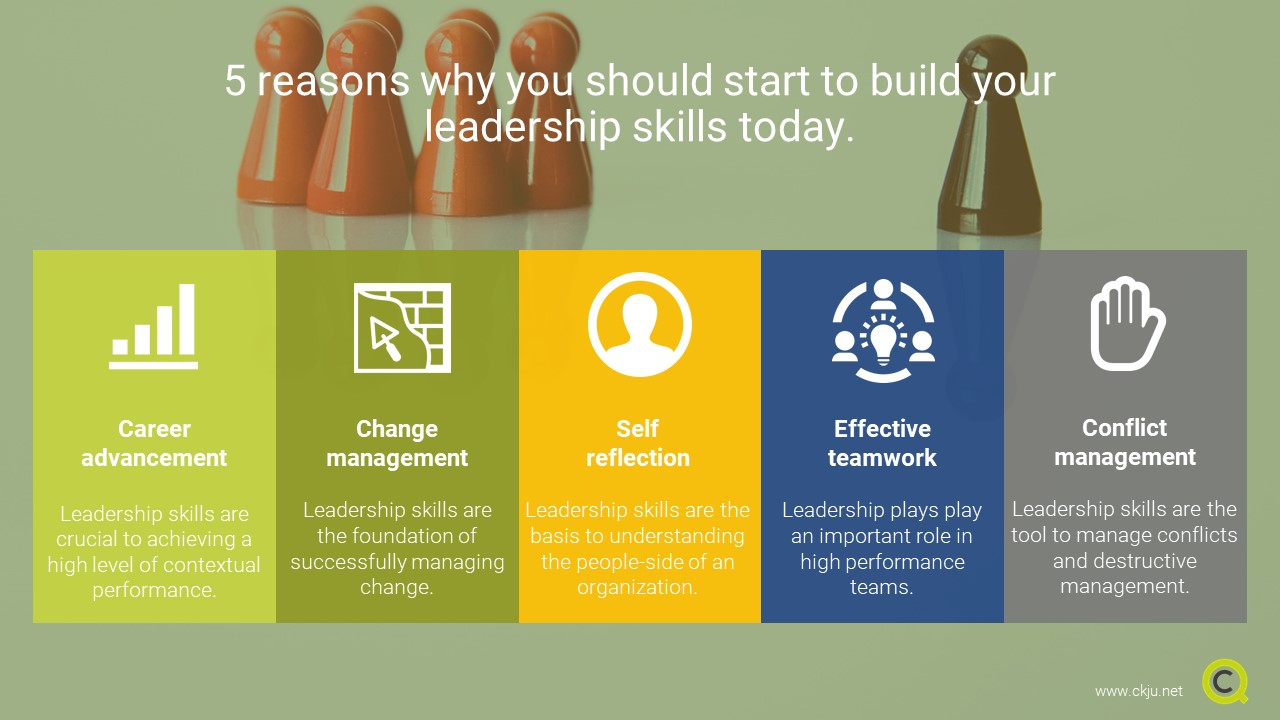- Blog
- Leadership skills
Contents
- Leadership is about “having an impact” on individuals, teams and organizations.
- Leadership is a soft skill to influence people and teams.
- Leadership is the effect we have on others.
- Leadership skills are important for your career advancement.
- Leadership skills are important to manage change.
- Leadership skills help you to better understand yourself.
- Leadership skills are important for effective teamwork
- Leadership skills are the foundation to manage conflicts and cope with destructive managers.
- Leadership skills are important for all knowledge workers.
- References and further reading
Leadership is the process of influencing others to understand and agree about what needs to be done and how to do it, and the process of facilitating individual and collective efforts to accomplish shared objectives.Yukl (2002, p. 26)
Leadership is about “having an impact” on individuals, teams and organizations.
When people talk about leadership, they usually think of CEOs, supervisors, senior managers or politicians who hold a formal leadership position. This traditional understanding of leadership assumes that leadership skills are only relevant for a handful of selected individuals. However, thanks to the progress in social sciences and the internet, there is much more leadership knowledge available that paints a totally different picture. Leadership is about “having an impact” on an individual, team and organizational level.
Let’s think for a minute about why you decided to work in a company, governmental or non-governmental organization.
- Don’t you want to have an impact?
- Don’t you want to change something or contribute to your organization’s success?
- Don’t you want to grow your individual career and learn something new for yourself?
Leadership is a soft skill to influence people and teams.
There are hundreds of leadership definitions around. We picked one of them from Yukl (2002) to give you an idea about the key themes connected to leadership:
“Leadership is the process of influencing others to understand and agree about what needs to be done and how to do it, and the process of facilitating individual and collective efforts to accomplish shared objectives”. (Yukl, 2002, p. 26)
When you look at this leadership definition you might conclude that leadership is very much a soft skill to influence people and teams in a way that shared objectives are achieved. Looking at leadership from this perspective makes it very clear that leadership skills are not just relevant for a selected group of senior executives. Leadership skills are important for everyone who works in an organization AND who wants to have an impact.
Leadership is the effect we have on others.
Leadership can also be defined as the effect we have on others. All our daily interactions do have a more or less intense effect on other people. However, interaction is not limited to speaking to somebody. It also covers your written communication such as e-mails, reports, presentations and your non-verbal communication such as gestures, the clothes you wear and the way you show emotions.
In addition, leadership is also the way you react to other people’s interaction with you. Let’s assume somebody asks you for help in solving a pressing business problem that is not directly within your area of responsibility. Whether you agree or not has a lasting impact on the relationship between you and the person who asked you for help.
The magnitude of your leadership intervention could even go beyond that relationship. Let’s assume your interaction is observed by other people in the organization. If this is the case, your interaction would have influenced not just one person, but rather an entire team or department.
On an organizational level, your intervention challenges or reinforces generally agreed-upon assumptions about how the organization works or should not work. This cultural dimension of leadership is an indirect effect of your interaction with others. You can’t directly manage organizational culture, but you can influence it indirectly.
Now that we talked about what leadership is about, the question arises why you should care about your leadership skills. In fact, there are several reasons why you should nurture and strengthen your leaderships skills.
Leadership skills are important for your career advancement.
Career advancement in organizations adheres to an easy equation: The more you contribute to the success of an organization, the higher is the chance of getting promoted. How can you contribute to your organization’s success? The magic words are job or task performance, and contextual performance.
Job performance
Job performance is your contribution to getting things done and to staying ahead of the curve in terms of knowledge relevant for your job (Koopmans et al., 2011). It is about specific tasks such as launching a new product to the market, solving a pressing business problem or achieving an agreed-upon objective within a defined timeframe. When people talk about performance, they usually refer to job performance. As a consequence, they put all their efforts into the task performance dimension and overlook what is at least as important: Contextual performance.
Contextual performance
Contextual performance goes beyond getting things done and refers to your contribution to the overall well-being of the organization. It is about your interpersonal relations, whether you communicate effectively and your efforts to cooperate with others (Koopmans et al., 2011). In a VUCA world (volatility, uncertainty, complexity and ambiguity) where many tasks are assigned to teams, contextual performance is more than only 'nice to have'. It is an important part of the performance – career advancement quotation.
Leadership skills are an important prerequisite to achieving a high level of contextual performance. This applies even more in a complex work environment which is typical for jobs in the 21st century knowledge economy. Interestingly, the benefits of leadership skills for career advancement are universal and not just related to formal leadership positions.
Leadership skills are important to manage change.
A considerable part of organizational life is about managing change. This applies not just to traditional leadership positions, but to almost everyone working in and with organizations. Whether you want to change a process, introduce a new product or just win over your team, peers or boss for a project, you need to have a basic understanding of how change can be managed in order to succeed.
Transformational leadership
Do you remember the leadership definition we introduced earlier in this article? Yes? Then you will agree that leadership skills are the foundation of successfully managing change. Let us make one example. One of the most popular leadership approaches is transformational leadership (Bass, 1990). It is built on the assumption that leadership is very much about inspiring people about something they feel is important to them.
In terms of change management, this translates into creating a picture of the future state of your project, department or even organization. You can ask the following questions and discuss them in your organization:
- How does the change initiative contribute to the future of the organization?
- What will the change initiative change to the better compared to the current state?
- Why does it make sense to go through the change initiative looking into the future?
Besides having a clear picture of the future, it is very important to communicate and share it which is another important leadership skill.
Leadership skills help you to better understand yourself.
Leadership is about people. Consequently, you need to have a basic understanding of some psychological concepts that help you to understand the people-side of an organization. The nice side-effect of knowing those psychological concepts is that you will also better understand yourself. We’ll take a look at two examples.
Five Factor Model of personality
People tend to behave in similar situations in a similar way up to a certain extend. The five factor model of personality is the results of years of empirical research in the area of individual differences ( (McAdams, 1992). It describes personality traits in the five different dimensions: Openness to Experience, Conscientiousness, Extroversion, Agreeableness and Neuroticism. Being aware of your personality traits is tremendously beneficial to better understanding yourself and your effect on others. Furthermore, it also helps you to predict the potential (side-)effects your leadership intervention has on others.
Intrinsic versus extrinsic motivation
Motivation is what makes us move. However, not everybody is motivated in the same way. One approach to better understand how motivation works distinguishes between intrinsic and extrinsic motivation (Gagné & Deci, 2005).
Intrinsically motivated people enjoy doing things without the need of external incentives to “pull” them in a certain direction. They appreciate a high level of autonomy and even feel uncomfortable when their actions are connected to external rewards such as bonuses or goal agreements.
Extrinsically motivated people find it more rewarding to get external incentives that are connected to certain actions. The are more driven by the appreciation they get from the external environment (peers, supervisor, organization) instead of the action itself.
In real life, you’ll find nobody who is solely intrinsically or extrinsically motivated. Most of us are located in between the two extremes. Where would you assign yourself between those two extremes?
Leadership skills are important for effective teamwork
Have you ever wondered which factor determines whether a team performs well or not? There is a strong evidence base that human factors (soft skills) play an important role in high performance teams. For instance, one of the most researched team performance interventions called Crew Resource Management (CRM) relies on four soft skill categories (van Avermaete, 1998):
- Co-operation
- Leadership
- Situational Awareness
- Decision Making
Again, leadership skills in combination with other soft skills competencies are the key to success.
A specific example of a leadership intervention that increase team performance are Team Mental Models (TMMs). Team Mental Models (DeChurch and Mesmer-Magnus 2010a, 2010b) are a cognitive map that reflect the team’s objective, tasks, roles and responsibilities. The team performance is directly connected to the similarity of the team mental model each team member holds.
Leadership skills are the foundation to manage conflicts and cope with destructive managers.
A considerable number of people report that the worst thing in their life is their supervisor or boss (Hogan & Kaiser, 2005). Toxic or destructive leadership is a more common issue in organizations than one might think at first glance. Have you ever experienced a destructive supervisor?
In a best-case scenario, the leader derails and gets replaced by a more competent one. In a worst-case scenario, you must deal with him or her and find a way to cope with the situation. Leadership skills are the tool you need to understand conflicts in general and what drives your destructive boss in particular.
Let us make one example: Trait based approaches to leadership are built on the assumption that certain personality traits are related to leadership performance, while others are not. There is even a set of personality traits that are connected to destructive leadership. Being aware of how your toxic boss “ticks” is the very basis to deal with him or her or even avoid having a destructive supervisor at all.
Leadership skills are important for all knowledge workers.
Leadership skills are no longer only relevant for CEOs and senior executives. In the 21st century knowledge economy, all of us are leaders and thus have to build and hone our leadership skills. In this article we had a look at five reasons why you should start to build your leadership skills today.
We at CQ Net - Management skills for everyone! offer you a variety of high quality, affordable leadership trainings specifically tailored to your needs.
References and further reading
Bass, B. M. (1990). From transactional to transformational leadership: Learning to share the vision. Organizational Dynamics, 18(3), 19–31. DOI: 10.1016/0090-2616(90)90061-s
DeChurch, Leslie A.; Mesmer-Magnus, Jessica R. (2010a): Measuring shared team mental models. A meta-analysis. In Group Dynamics: Theory, Research, and Practice 14 (1), pp. 1–14. DOI: 10.1037/a0017455 .
DeChurch, Leslie A.; Mesmer-Magnus, Jessica R. (2010b): The cognitive underpinnings of effective teamwork. A meta-analysis. In The Journal of applied psychology 95 (1), pp. 32–53. DOI: 10.1037/a0017328 .
Gagné, M., & Deci, E. L. (2005). Self-determination Theory and work motivation // Self-determination theory and work motivation. Journal of Organizational Behavior, 26(4), 331–362. DOI: 10.1002/job.322
Hogan, R., & Kaiser, R. B. (2005). What we know about Leadership. Review of General Psychology, 9(2), 169–180. DOI: 10.1037/1089-2680.9.2.169
Koopmans, L., Bernaards, C. M., Hildebrandt, V. H., Schaufeli, W. B., Vet Henrica, C. W. de, & van der Beek, A. J. (2011). Conceptual frameworks of individual work performance: A systematic review. Journal of Occupational and Environmental Medicine, 53(8), 856–866. DOI: 10.1097/JOM.0b013e318226a763
McAdams, D. P. (1992). The Five-Factor Model In Personality: A Critical Appraisal. Journal of Personality, 60(2), 329–361. DOI: 10.1111/j.1467-6494.1992.tb00976.x
van Avermaete, J.A.G. (1998): NOTECHS: Non-technical skill evaluation in JAR-FCL. National Aerospace Laboratory NLR.
Yukl, G. A. (2002). Leadership in organizations (5th ed.). Upper Saddle River, Nj: Prentice Hall.
Top Rated
About the Author

Comments
Most Read Articles
Blog Categories
RELATED SERVICES










Add comment